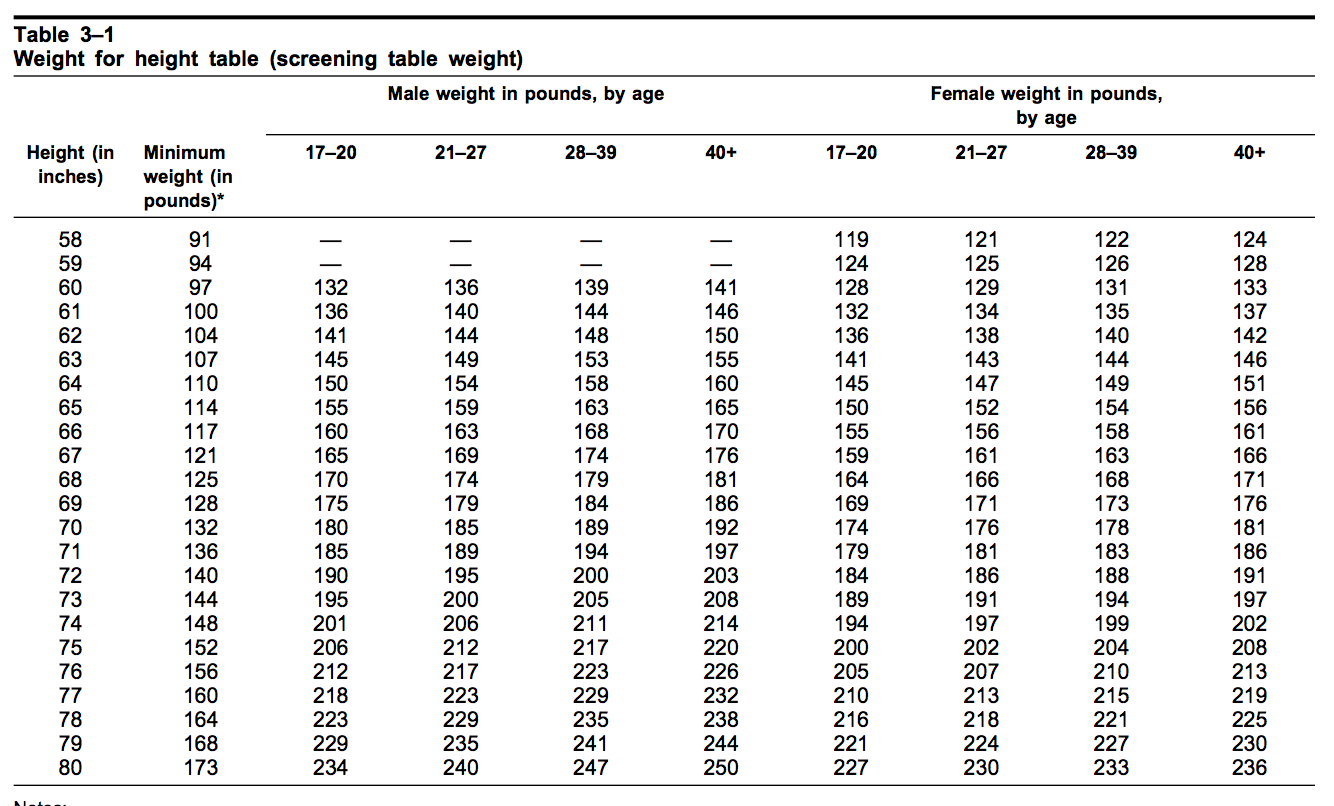When it comes to military service, meeting the army height and weight standards is crucial for enlistment and continued service. These standards ensure that soldiers are physically fit and capable of performing their duties effectively. In this article, we will delve into the specifics of the height and weight requirements for the army, explore their significance, and provide insights into how potential recruits can achieve these standards.
The army height and weight standards are not merely arbitrary numbers; they are essential criteria that help maintain the operational readiness of military personnel. Soldiers must be physically capable of enduring the rigors of training and combat, and these standards serve as a benchmark for evaluating fitness levels. Understanding these requirements is vital for anyone considering a career in the military.
In this guide, we will cover the various factors that influence army height and weight standards, the consequences of not meeting these standards, and tips for achieving and maintaining the required physical fitness. Whether you are a prospective recruit or simply interested in the military’s physical fitness requirements, this article will provide valuable information to help you navigate the complexities of army height and weight standards.
Table of Contents
- 1. Importance of Height and Weight Standards in the Army
- 2. Army Height and Weight Requirements
- 3. Consequences of Not Meeting Standards
- 4. Factors Affecting Height and Weight Standards
- 5. Tips for Meeting Army Height and Weight Standards
- 6. Resources for Physical Fitness
- 7. Conclusion
1. Importance of Height and Weight Standards in the Army
Height and weight standards in the army serve several critical purposes:
- Operational Readiness: Ensuring that all soldiers are fit for duty helps maintain the overall effectiveness of military operations.
- Health and Safety: These standards help reduce the risk of injury and ensure that soldiers can perform physically demanding tasks.
- Uniformity: Maintaining a standard helps create a cohesive and disciplined environment within the ranks.
2. Army Height and Weight Requirements
The army has specific height and weight standards for both male and female soldiers. These standards are determined based on age and gender to ensure fairness and accuracy.
2.1. Male Standards
For male soldiers, the height and weight requirements vary based on age groups. Here are the general standards:
| Height (inches) | Weight (pounds) |
|---|---|
| 60 | 140 - 200 |
| 70 | 150 - 230 |
| 80 | 160 - 250 |
2.2. Female Standards
Similarly, the standards for female soldiers are also based on height and age:
| Height (inches) | Weight (pounds) |
|---|---|
| 60 | 110 - 170 |
| 70 | 120 - 180 |
| 80 | 130 - 190 |
3. Consequences of Not Meeting Standards
Failing to meet the army height and weight standards can lead to several consequences:
- Ineligibility for Service: Potential recruits who do not meet these requirements may be disqualified from enlistment.
- Disciplinary Action: Active soldiers who fail to maintain standards may face disciplinary measures, including counseling or separation from service.
- Impact on Career Progression: Soldiers who do not meet standards may be ineligible for promotions and special assignments.
4. Factors Affecting Height and Weight Standards
Several factors can influence an individual's ability to meet army height and weight standards:
- Genetics: Genetic factors can affect an individual's height and body composition.
- Diet: A balanced and nutritious diet is crucial for maintaining a healthy weight.
- Exercise: Regular physical activity is essential for achieving and sustaining fitness levels.
5. Tips for Meeting Army Height and Weight Standards
Here are some effective tips for potential recruits and active soldiers:
- Set Realistic Goals: Establish achievable fitness goals based on your current physical condition.
- Follow a Structured Exercise Program: Incorporate a mix of cardiovascular, strength, and flexibility training into your routine.
- Monitor Your Diet: Focus on whole foods, lean proteins, fruits, and vegetables while limiting processed foods.
- Seek Professional Guidance: Consider consulting a fitness trainer or nutritionist for personalized advice.
6. Resources for Physical Fitness
There are numerous resources available to help individuals meet army height and weight standards:
- Military Fitness Programs: Many military branches offer fitness programs designed to help recruits prepare for service.
- Online Fitness Communities: Online platforms provide support and advice for those looking to improve their fitness.
- Books and Guides: Numerous publications offer insights into fitness training and nutrition.
- Mobile Apps: Fitness tracking apps can help individuals monitor their progress and stay motivated.
7. Conclusion
In conclusion, understanding army height and weight standards is essential for anyone considering a military career. These standards play a crucial role in ensuring the fitness and readiness of soldiers. By setting realistic goals, following a structured fitness program, and maintaining a healthy diet, potential recruits can achieve the necessary standards and enjoy successful military service. If you have questions or would like to share your experiences, please leave a comment below or share this article with others.
We hope this article has provided you with valuable insights into army height and weight standards. Stay fit, stay motivated, and always strive for excellence in your physical fitness journey!




